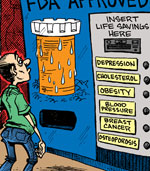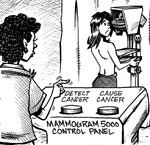Why You Should Not Pay Good Money for a Serotonin Blood Test
| Share on Facebook | Share on Twitter | Share on Google+ |
Testing your blood for serotonin would seem like a great way to tell whether sadness is due to depression, a biochemical condition caused a shortage of serotonin in the brain, or due to a passing personal situation. The way the brain uses serotonin, however, makes this kind of testing impractical.
Modern medications for depression do not increase the amount of serotonin in the brain. What the serotonin reuptake inhibitors (SSRIs) do is to stop neurons from reabsorbing serotonin, keeping it in the gaps between neurons so it can transmit nerve impulses. The serotonin acts as a bridge over which nerve impulses can travel. The problem in depression is not that there is no serotonin, but rather than there is no bridge.(More about serotonin and depression).
Testing serotonin levels only requires a simple blood test. But since serotonin deficiency testing does not give any information useful for treating depression, why would any doctor order it?
The main use for serotonin testing is to test for the presence of carcinoid syndrome. Carcinoid tumors usually grow from stem cells in the wall of the small intestine or the appendix, but they can also occur in the rectum, colon, stomach, and liver.
Carcinoid tumors make variable amounts of serotonin. Tumors at the top and bottom ends of the intestines make relatively small amounts of serotonin, while tumors in the middle of the intestines make the most. A serotonin test can tell the doctor where to look for the tumor, exposing the patient to a minimum of radiation from CAT and PET scans.
The most important step in preparation for a serotonin blood test is to avoid eating foods that stimulate the production of serotonin by the lining of the gastrointestinal tract. Some of these foods are avocado, bananas, eggplant, pineapple, plums, tomatoes, and walnuts, all of which should be avoided for at least three days before blood is drawn to run the test.
-
Skin CareMen Skin Care
-
Free ResourcesFree eBooks
-
Let food be thy medicine, and let thy medicine be food.Hippocrates
-
Featured Health Supplement"...I also suffer from mild-to-moderate depression, so several months ago as an experiment I ordered a few bottles of the Neuro-Natural Serenity formula, but never took it consistently. However, I started taking it faithfully last week at full dose and already my spirits are lifting and I have a greater clarity of mind."
Cathi, USA -



















